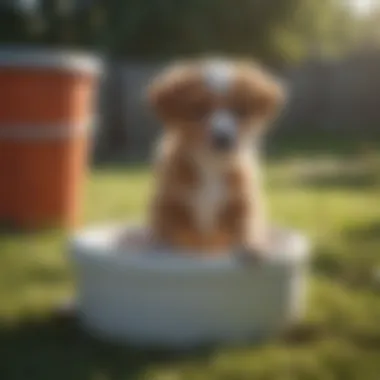Understanding Frequent Urination in Puppies


Intro
Frequent urination in puppies can leave many pet owners scratching their heads. While the sight of a young pup trotting off to make their mark might seem cute at first, it can also signal deeper issues that warrant attention. Understanding why a puppy may need to pee more often than expected is crucial for anyone who has taken on the joyful responsibility of raising a new furry friend. By diving into the various causes, from health concerns to behavioral shifts, this article aims to shed light on this common predicament.
As a puppy matures, several factors influence their urinary habits. It’s not just about bladder size or training techniques, but also about understanding their health, environment, and even the intricacies of their development. By unpacking this issue, we aid not just the puppies but also the conscientious owners who wish to support their pets’ well-being.
Fascinating Facts About the Animal
Understanding the canine world can provide essential insights into the needs and triggers of our puppies. It helps us as pet owners become more informed and equipped to manage their behaviors. Here are some intriguing facts about our canine companions:
- Unique Characteristics: Puppies, like all dogs, possess extraordinary traits that set them apart. For instance, their sense of smell is approximately 40 times better than that of humans. This powerful olfactory ability plays a significant role in their instinctive urges to mark territory, including their urine.
- Extraordinary Abilities: Dogs also showcase some remarkable physiological advances. For example, their bodies have an impressive ability to filter waste, adapting well to varied diets. This can influence how often they need to urinate, largely depending on what they consume and how well their bodies process it.
Behavior and Habitat
When we look at puppies through a behavioral lens, we can understand more about why they're prone to frequent restroom breaks. Puppy behavior is closely tied to their natural behaviors in the wild.
- Natural Habitats: In the wild, canines tend to mark their territory as a communications tool. As domesticated pets, they still retain some of these behaviors. Puppies might urinate frequently as a way of asserting their presence, reflecting their instinctual habits.
- Social Structures: Puppies also engage in social behaviors that can unknowingly influence their urination patterns. When in the presence of other dogs or even humans, they might feel compelled to urinate more often, often as a sign of submission or friendly greetings.
Recent Scientific Discoveries
The world of canine biology is ever-evolving, with new research constantly shedding light on their complexities.
- Latest Research Findings: Recent studies indicate that certain breeds may have predispositions to specific urinary behaviors, which can influence how often they seek to urinate. For instance, smaller breeds often have smaller bladders, leading to more frequent breaks.
- Breakthroughs in Animal Biology: Advances in veterinary medicine and animal biology further clarify the relationship between diet and urinary frequency. High-protein diets or overly processed foods can lead to increased need to eliminate waste, affecting a puppy's urination habits markedly.
Cultural Significance
Throughout history, dogs have held a significant role in human cultures worldwide.
- Animals in Folklore: Many civilizations have included dogs in their folklore, often tying their behaviors and characteristics to stories of loyalty and guardianship. This highlights our intrinsic connection to these animals, making it essential to understand their needs, including urinary habits.
- Influence on Art and Literature: Dogs have inspired countless works of art and literature, symbolizing friendship and fidelity. Understanding their behaviors, including urination, enriches our appreciation of their place in our lives.
Through these lenses, we not only grasp the scientific backdrop of puppy urination but also see how this issue resonates throughout human history, culture, and, importantly, our everyday lives with our dogs.
Prologue to Puppy Urination Patterns
Understanding how puppies urinate isn't just about getting a handle on bathroom breaks; it’s a window into their health, behavior, and overall well-being. Frequent urination can sometimes raise eyebrows, especially for new puppy owners. However, it’s crucial to appreciate that puppies have unique peeing patterns that can differ significantly from adult dogs. A young dog’s bladder is still developing, and their need to relieve themselves is often more pressing than in older canines.
Moreover, the significance of recognizing normal versus abnormal urination habits can’t be stressed enough. This knowledge is not only valuable for owners but also for veterinarians and wildlife biologists who might need to identify key behavioral markers. Understanding these patterns helps in crafting a tailored approach to training and healthcare management.
The next sections will delve into the nuances of normal puppy behavior and the various factors that can set the stage for frequent urination. By laying this groundwork, we encourage puppy owners to observe and interpret their puppy’s habits effectively, ensuring both good practice in communication with their pets and proactive care when necessary.
Understanding Normal Puppy Behavior
To grasp why your puppy is often pawing at the door or showing an urgency to relieve themselves, it’s essential to start with the basics of what is normal. Puppies, especially when they are still learning their environment, tend to pee more frequently. Young pups usually can’t hold their urine for extended periods like older dogs can. Their small bladders combined with active play and excitement lead to a flurry of “potty time.”
There is a general guideline that puppies, depending on their age, can hold their bladder roughly one hour for every month of age. For instance, a three-month-old puppy may be able to go about three hours between bathroom breaks. Knowing this can help foster better training habits and prevent accidents in the house.
Setting the Context for Frequent Peeing
While heightened urination can be a typical puppy behavior, it can also signal underlying issues that require attention. Sometimes, it might stem from high water intake due to hot weather or simply excitement. However, it can also hint at something more serious, like a urinary tract infection or diabetes mellitus.


To put it into perspective, consider the following common reasons that could lead to frequent urination in puppies:
- Hydration: Puppies tend to drink more fluids, which naturally causes them to urinate more.
- Training: Inconsistent routines or lingering anxiety can lead to increased urination due to stress.
- Physical Health Issues: Conditions like infections can influence a puppy’s need to urinate more frequently.
Puppy owners must remain vigilant in distinguishing between what is typical and what may warrant a vet visit. Monitoring when and how often your puppy urinates allows for informed discussions with a veterinarian, which is essential for the pup's health. The knowledge base around these habits is vital for ensuring that your puppy is not just learning but thriving.
Anatomical Factors Influencing Urination
Understanding the anatomical factors that underpin urination in puppies is crucial for pet owners and professionals alike. These factors provide insight into a puppy's urinary habits and overall health. By grasping these anatomical characteristics, one can better interpret normal behavior compared to signs of potential problems. This knowledge helps not just in managing frequent urination, but also in ensuring the overall well-being of a growing pup.
The Puppy Bladder: Structure and Capacity
The bladder in a puppy is designed quite differently from that in mature dogs. A puppy's bladder is smaller, meaning its ability to hold urine is limited. On average, a puppy's bladder can hold about 10-12 ounces of urine, which isn't much when you consider their small size.
- Elasticity: Unlike in older dogs, the puppy's bladder walls are more elastic. This means as the bladder fills, it expands, but only to a point. They may not always signal to go outside until it's nearly full.
- Development Stages: Puppies undergo several developmental stages. For instance, a two-month-old pup may need to urinate as often as every hour! This frequency decreases as they grow, primarily due to their bladder’s growth and their ability to hold urine improving.
- Implications for Owners: Frequent trips outdoors are essential during this developmental phase. Recognizing that their bodily functions are still evolving helps owners set realistic expectations regarding house training.
Nephron Functionality in Young Dogs
Nephrons are the functional units of the kidney responsible for filtering blood and producing urine. In young dogs, nephron functionality is still maturing, which bears a significant impact on urination frequency.
- Number of Nephrons: A puppy is born with a limited number of nephrons, which increases as they mature. When their body is still developing, it can’t adequately concentrate urine, leading to more frequent urination.
- Concentration Ability: Initially, young dogs cannot concentrate their urine as effectively as adult dogs. This means the urine produced is less concentrated which can lead to more frequent urination.
- Health Considerations: If you notice an excess of urination that greatly exceeds normal frequency for their age, there might be an underlying health issue affecting nephron function, demanding attention.
Frequent urination in puppies often signals not just immature anatomy, but also a need for careful observation and responsiveness from their owners.
Taking these anatomical insights into account can shine a light on your puppy’s urinary behavior, helping you discern between typical patterns and signs of potential health issues. This understanding is fundamental in navigating the early stages of your puppy’s development.
Health Issues That Cause Frequent Urination
When it comes to young pups, frequent urination can signal a myriad of underlying health issues. Recognizing the importance of this topic goes beyond just addressing the immediate annoyance of cleaning up after your furry friend. It serves as a critical lens through which pet owners can understand their pup’s well-being. Awareness of potential health disorders not only fosters a proactive approach in management but also equips owners with the necessary knowledge to seek timely veterinary care.
Frequent urination can often masquerade as a behavioral issue when, in fact, it might hint at something much more serious. Failing to notice these signs can lead to prolonged discomfort for the pup and escalating medical costs for the owner. An understanding of the health issues that could be at play is essential for every responsible pet parent.
Urinary Tract Infections: Symptoms and Risks
One of the most common culprits behind excessive urination in puppies is a urinary tract infection (UTI). Symptoms can vary but often include:
- Increased frequency and urgency of urination
- Accidents in the house even after house training
- Visible discomfort or straining when urinating
- Blood in urine or an unusual odor
The risks associated with leaving a UTI untreated can be significant. They include the potential for kidney damage or more serious systemic infections. If you suspect your puppy has a UTI, it's imperative to consult a veterinarian promptly. A proper diagnosis and treatment plan, which often involves antibiotics, can swiftly restore your puppy's comfort and health.
Diabetes Mellitus in Puppies
Another serious health issue to be aware of is diabetes mellitus. Though often linked with older dogs, puppies can be affected as well. Common signs include:
- Excessive thirst and urination
- Increased appetite yet noticeable weight loss
- Lethargy or weakness
Diabetes occurs when the body fails to produce adequate insulin, making it difficult for glucose to enter the cells for energy. Acting quickly upon noticing symptoms is crucial; undiagnosed diabetes can lead to life-threatening complications. A vet will likely recommend a combination of insulin therapy, diet management, and regular monitoring to help manage this condition effectively.
Kidney Disorders and Their Impact
Kidney issues, ranging from congenital anomalies to infections, can also contribute to frequent urination. The kidneys play a vital role in filtering waste and balancing fluids in the body. Here are signs that may indicate kidney problems:


- Increased urination
- Increased thirst
- Vomiting or decreased appetite
- Weight loss
Just like with other health issues, early detection of kidney disorders can make a world of difference. Treatment depends on the specific issue at hand and may involve medications, dietary changes or even more advanced options.
Behavioral and Psychological Factors
Sometimes, frequent urination isn’t a health problem but rather a behavioral or psychological one. Puppies are particularly sensitive to their environments, and stress factors might include:
- Changes in routine, like moving to a new home
- New additions to the family, whether pets or people
- Lack of social exposure leading to anxiety
Understanding that a young pup's frequent urination can also be tied to their emotional state, helps owners cultivate an environment that alleviates stress. Techniques may include providing comfort items, establishing a stable routine, and gradually introducing the puppy to new experiences. Being attuned to both the emotional and physical health of your puppy will be pivotal in addressing frequent urination effectively.
"Understanding and responding to your puppy’s needs—be it health or emotional—can make all the difference in their well-being."
Overall, frequent urination in puppies can arise from various health issues, each with its own implications and risks. Recognizing and addressing them is key to ensuring a happy and healthy life for your four-legged companion.
Dietary Considerations
Dietary considerations play a pivotal role in understanding the urination habits of puppies. What we feed our furry friends not only affects their growth and energy levels but also has direct implications on their urinary habits. This section aims to shed light on how hydration levels and the composition of their diet can influence how often a puppy needs to relieve itself.
Hydration Levels and Their Effects
Water consumption is one of the most significant factors behind a puppy's urination frequency. Puppies, known for their playful antics, often lead an active lifestyle that necessitates adequate hydration. If they’re kept well-hydrated, it stands to reason that they will need frequent bathroom breaks. This is perfectly normal.
"Understanding a puppy's hydration status allows us to manage its urinary needs more effectively."
However, it's not just about the amount but also the timing of hydration. For instance, if you’re providing water all day long without monitoring how much they're drinking, their pee patterns may become erratic. Ensure their water bowl is filled with fresh water multiple times a day, yet consider limiting their intake just before bedtime to reduce overnight disturbances.
Role of Food Composition in Urination Frequency
The type of food a puppy eats significantly contributes to how much water they need, influencing their urination frequency. High-quality dry kibble often requires more water intake compared to wet food, which has a higher moisture content. Understanding this difference can help you control how often your puppy urinates.
Common elements to consider in your puppy’s food include:
- Protein Content: Foods high in protein can lead to increased urine production, as the body needs to rid itself of excess nitrogen.
- Carbohydrates: Some carbohydrates can lead to more fluid retention, which might reduce the frequency of urination.
- Additives and Preservatives: Artificial additives can sometimes lead to increased thirst or urinary irritation, prompting more frequent trips outside.
Balancing these components is crucial. It might be worthwhile to look closely at the ingredients in the food you choose for your puppy and consider consulting with a veterinarian to determine if the current diet is appropriate for your pet's age and activity level. An appropriate balance of nutrients based on your puppy’s specific needs can prevent overhydration and subsequent increased urination.
Training and Behavioral Aspects
Understanding the training side of frequent urination in puppies is crucial for owners wishing to help their young canines develop healthy habits. An effective training approach can minimize accidents and foster a more comfortable living environment for both puppy and owner. This entails recognizing that a puppy's behavior is often a reflection of their development stage, and being mindful of this can significantly influence their urination patterns.
While it’s tempting to focus solely on what the puppy is doing wrong during house training, it’s equally important to understand that their frequent urination can stem from a lack of proper guidance and structure. Providing the right training can not only reduce accidents indoors but also help puppies feel more secure and confident in their surroundings.
House Training Techniques: Common Pitfalls
House training can sometimes feel like navigating a minefield for new puppy owners. Common pitfalls include overlooking the puppy's signals, being inconsistent with potty breaks, and expecting too much too soon. For example, a puppy may whimper or circle before needing to relieve themselves, but owners might dismiss these behaviors as mere playfulness. Paying attention to these signs can make a world of difference.
Moreover, inconsistency can lead to confusion for the puppy. If they are taken outside to relieve themselves at varying times, they might not grasp when it is appropriate to go.
A few strategies to consider:


- Set a Schedule: Develop regular feeding times and stick to them. This helps manage when they need to go out.
- Frequent Potty Breaks: Puppies have small bladders. Ensure they have ample opportunities to relieve themselves, ideally every couple of hours.
- Positive Reinforcement: When they do their business outside, reward them with praise or treats. This encourages them to repeat the behavior.
Knowing these points, owners can navigate the training process with greater ease.
The Importance of Routine and Consistency
Establishing a solid routine is fundamental for any training plan. Dogs thrive on predictability, and by creating a consistent schedule, owners help their furry companions feel secure. This doesn’t just apply to potty breaks but encompasses feeding times, play periods, and even bedtime.
A routine can greatly reduce anxiety in puppies, as they know what to expect and when. For instance, a feeding schedule helps regulate digestion, ultimately influencing bathroom habits.
Consider these aspects to bolster your training routine:
- Maintain Regular Timing: Try to take your puppy out first thing in the morning, after meals, and before bedtime. These predictable moments act as cues for the puppy’s biology.
- Adapt to Changes Gradually: If you need to alter their routine due to changes in your schedule, do it gradually to help your puppy adjust without added stress.
- Consistency in Commands: Always use the same words for potty commands. This clarity helps the puppy form an association quickly.
Training a puppy requires patience and dedication, but a well-structured routine can tremendously help in managing frequent urination issues.
Psychological Factors and Stress Responses
The interplay of psychological factors in a puppy's life can have profound effects on their physical well-being, especially when it comes to urination. Understanding these psychological elements is paramount for any puppy owner, as they can reveal the underlying causes of behaviors that may otherwise go unnoticed. Frequent urination is often not just a biological response but can be symptomatic of deeper emotional or psychological issues. Addressing these factors enables better management of a puppy's health and adaptability in their environment.
Recognizing Anxiety in Puppies
Puppies, much like human babies, experience a range of emotions, and anxiety is one of the more common feelings they can encounter. It's crucial to learn how to recognize the signs of anxiety in puppies because it can manifest in various ways, including frequent urination. Common indicators of anxiety might include:
- Pacing or repetitive movements: If a puppy is constantly on the move, they may be feeling restless.
- Whining or howling: Vocalizations often indicate distress.
- Hiding or avoiding interaction: When a puppy shies away from contact, it's a signal that something might be bothering them.
- Excessive panting beyond regular exercise: Stress can lead to panting, even when the puppy isn’t physically active.
Identifying anxiety can be the first step in addressing it. If your puppy seems anxious, it helps to observe what situations trigger their stress. That could be anything from loud noises, changes in household dynamics, or unfamiliar faces. A well-informed owner can then take steps to alleviate that anxiety, which may ultimately reduce unwanted urination.
Environmental Stressors and Their Impact
The environment a puppy grows up in significantly shapes their behavior and emotional health. Various stressors—some obvious, others more subtle—can create an atmosphere that triggers anxiety in your pup. Here are some environmental factors to consider:
- Loud noises: Fireworks, thunderstorms, or even vacuum cleaners can frighten a young dog, prompting them to urinate involuntarily.
- New surroundings: A puppy moving to a new home might feel overwhelmed, leading to nervous urination.
- Crowded spaces: Too many people or other animals can create a daunting environment for a puppy, pushing them into a stress response.
- Inconsistent routines: Puppies thrive on routine; abrupt changes can lead to anxiety, affecting their bodily responses, including the need to urinate.
In summary, a holistic approach to understanding a puppy's frequent urination must encompass not just physical health but also psychological wellness. Reducing stressors in their environment and taking care of their emotional needs can make a world of difference. By prioritizing these aspects, owners can create a nurturing space where their pets feel secure and are less likely to exhibit stress-related urination.
"The more you understand a puppy's emotional landscape, the better you can tailor their environment to suit their needs."
By being vigilant about anxiety and environmental stressors, you can help your puppy thrive both emotionally and physically, leading to a happier and healthier life.
Epilogue
The topic of frequent urination in puppies encapsulates various significant factors that every dog owner should understand. This behavior, while often concerning, can stem from normal anatomical traits or indicate underlying health issues. It’s crucial to recognize that not all frequent urination is due to medical problems; sometimes it's just a natural part of a puppy's development. By unraveling the layers of this subject, we can better manage our furry friends, ensuring their wellbeing and happiness.
Summarizing the Key Takeaways:
- Understanding Normal Behavior: Recognizing what constitutes normal urination patterns in puppies helps distinguish between typical and concerning behaviors.
- Identifying Health Issues: Awareness of potential health problems, such as urinary tract infections or diabetes, is vital for early intervention. A well-informed owner is better equipped to handle health concerns proactively.
- Diet and Hydration: The composition of a puppy's diet and their hydration levels significantly impact urination frequency. Owners should balance nutrient intake and water availability.
- Training is Essential: Training aspects, including house training techniques and the environment, can influence a puppy's urination habits. Providing consistency in training can lead to improved outcomes.
- Keep an Eye on the Puppy's Mental Health: Psychological factors, including anxiety and stress, should not be overlooked. A supportive environment can mitigate stress-related urination.
Ultimately, knowledge is power. Understanding your puppy's needs will help in providing better care and improving their quality of life.
Encouraging Vigilance and Proactive Care:
Maintaining vigilance about a puppy's urination habits is critical. Owners should regularly observe their pets and note any changes, as these can be indicators of deeper issues. Here are some key practices:
- Daily Observations: Keep track of how often your puppy urinates. An increase in frequency might warrant a trip to the vet.
- Maintain a Routine: Establishing a consistent routine for feeding and bathroom breaks can help regulate urination.
- Consult Professionals: If you notice unusual patterns, seeking a veterinarian's advice is crucial. Early diagnosis can lead to more effective treatment options.
- Create a Supportive Environment: Minimizing stressors at home can help ease anxiety-related urination. Consider changes in surroundings or introducing calming products if needed.







